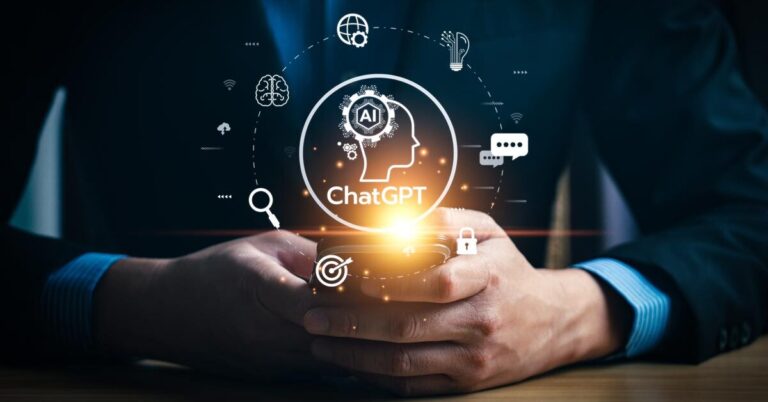
The job market is increasingly competitive, requiring recruiters to transform and elevate their processes to secure roles for their candidates. Generative AI tools like ChatGPT present a valuable opportunity for recruiters to streamline and optimize their processes, but the platform also comes with its share of risks and weaknesses.
Our recruiting experts dove into how ChatGPT is revolutionizing the recruiting process, as well as benefits and risks to consider when leveraging this cutting-edge technology.
Things to know about Recruiting in the Age of ChatGPT:
- What is ChatGPT
- Tips for Using ChatGPT
- When to use ChatGPT in the Recruiting Process
- When to be cautious using AI in the Recruiting Process
- How does AIM approach recruiting in the age of ChatGPT?
What is ChatGPT?
ChatGPT is a powerful language model operated by OpenAI. It has the ability to generate human-like text based on provided prompts. Its applications include content generation, programming help, and creative writing.
Tips for Using ChatGPT
When using ChatGPT or any other generative AI tool, keep the following best practices in mind:
- Be specific and clear in your instructions or prompts
- Start with simple context and gradually add complexity
- Experiment with different phrasing to see how the models respond
- Review and refine generated prompts to check for accuracy. Beware of “hallucinations.”
- Don’t enter personal or private information, such as email, phone number, or other personal identifiers. It will be stored in that database for life.
When to use ChatGPT in the Recruiting Process
Recruiters can improve their processes by using generative AI in the following ways:
- Ensuring the message you are trying to convey is clear
- Ensuring that the technical aspects of a resume are not misconstrued
- Interview prep
Ensuring the message you are trying to convey is clear
Recruiters need to cast their candidates in the strongest possible light. ChatGPT can help recruiters extract and reposition the most relevant details from a candidate’s resume in an articulate, polished, concise manner.
Example prompt: “In 50 words or less / In no more than 3 sentences, using information from this resume, create a summary of the candidate’s experience as a data engineer.”
ChatGPT’s outputs can be unnecessarily wordy, so you may need to follow this up with a “Make this shorter” prompt. But the results can help you position your candidates in a great light, highlight their expertise in a compelling way, and ultimately land them the interview.
Ensuring that the technical aspects of a resume are not misconstrued
Nontechnical recruiters may benefit from using ChatGPT to describe the more technical skills, experiences, and credentials of their candidates.
Example prompt: “Create one or two sentences on the candidate’s experiences in AWS, Snowflake, and Glue using this resume.”
This prompt generates highly technical outputs such as:
- Developed and maintained scalable data pipelines using AWS services such as S3, Glue, EMR, and Redshift.
- Designed and implemented ETL processes to extract, transform, and load data from various sources into the data warehouse.
- Ensured data quality and integrity by implementing data validation and cleansing techniques.
- Created and optimized SQL queries and stored procedures for data extraction, transformation, and reporting using SQL Server and PostgreSQL.
- Optimized ETL processes to improve performance and scalability using tools such as Apache Spark and Airflow.
Using the tool in this way can help you better articulate and demonstrate your candidate’s skillset, once again helping to land them an interview.
It’s worth noting that, as nontechnical individuals, recruiters may not always be fully confident in the accuracy of the outputs. After reviewing the output, if something feels fishy or off, they may reach out to the candidate and ask them to validate the information and language generated.
Interview prep
Once candidates make it to the interview stage, proper preparation is key to success. But nontechnical individuals may face challenges preparing candidates for technical screens. ChatGPT can support them in this process by generating example questions that may be asked in a technical interview.
Example prompts:
- “Given this Product Manager job description, what are questions that a hiring manager may ask when interviewing a candidate for the role?”
- “What are questions a Product Owner might ask a Full Stack .NET Sitecore Developer for a website upgrade/revamp?”
The latter generates specific, relevant questions such as:
- What measures will you take to minimize downtime during the deployment process?
- How do you plan to optimize the performance of the upgraded website?
- What is your strategy for migrating content and data from the current website to the upgraded version?
These prompts evidently generate questions that are highly customized to the position. This empowers recruiters to successfully and strategically prepare their candidates for interviews with realistic, technical questions.
This, in turn, enables you to increase candidates’ confidence and better equip them for success in the actual interview.
When to be cautious using AI in the Recruiting Process
ChatGPT can improve and strengthen the language in a candidate’s resume or summary; however, it can also overstep into over-architected language and embellishment. This results in content that is far lengthier than it needs to be and reads unnaturally.
In a perfect example of the outlandish language that generative AI can spit out, the tool provided this summary for one of our recruiter’s candidates:
“Recognized for his hallmark efficiency, unwavering commitment to unwavering high-caliber outcomes, and an unblemished history of project triumphs, he remains resolute in his pursuit of distinction across multifaceted commercial milieus. He stands ready to transcend and amplify any pulsating IT milieu.”
This is clearly unnatural and embellished language. The output may be improved by re-prompting the engine to “write at the twelfth-grade reading level.”
As a recruiter, proofreading ChatGPT’s outputs is particularly important – and not just for unnatural language. Because you cannot know a candidate’s resume, experience, and skills as well as you do your own, you need to take extra time and caution to check for any embellishment or downright fraudulence.
How Does AIM approach recruiting in the age of ChatGPT?
AIM Consulting is on the cutting edge of technology, transforming and optimizing our clients’ platforms, processes, and businesses with strategic solutions. We embrace the value of modern tools and technologies while also recognizing the value of the human element – we are confident that our people are our greatest asset.
ChatGPT is a powerful tool that can improve efficiency in the recruiting process. It allows our recruiters to highlight candidates’ greatest skills in a sophisticated and innovative way, boosting them above other applicants and competition. It ensures they get the right talent for the position.
However, generative AI is not perfect and never will be. While our recruiters use it for assistance and to bolster creativity, they also know that nothing will ever successfully replace the human component in their field.
ChatGPT is a tool we incorporate in our recruiting processes. But recruiters do not use exactly what the tool creates; rather, they use it as a starting point and edit as they see fit. AI is helpful, but if recruiters leaned too heavily on it, they would miss a lot of opportunities – such as finding the perfect candidate through their networks.
Interested in Challenging Yourself & Doing What You Love?
AIM is made up of explorers of knowledge, innovators through action, and engineers who are focused on people above all else.
If you’re interested in challenging yourself, doing what you love, and working in an environment that supports continuous learning and growth, check out our open positions today.





